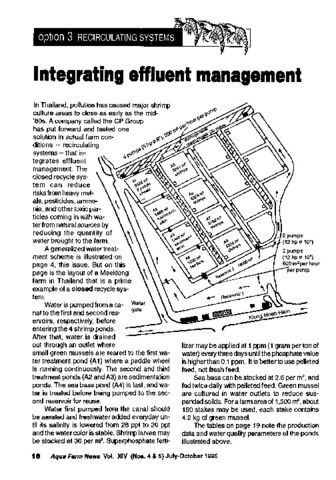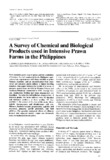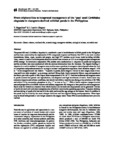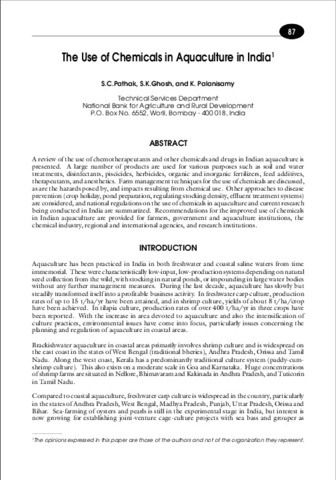Integrating effluent management
Share
Abstract
The paper discusses a closed recycle shrimp farm in Thailand which integrates effluent management. The closed recycle system can reduce risk of heavy metals, pesticides, ammonia, and other toxic particles coming in with water from natural sources by reducing the quantity of water brought to the farm.
Suggested Citation
Southeast Asian Fisheries Development Center, Aquaculture Department (1996). Integrating effluent management. Aqua Farm News , 14(4-5), 18-19. http://hdl.handle.net/10862/2434
Subject
Collections
- Aqua Farm News [286]
Related items
Showing items related by title, author, creator and subject.
-
A survey of chemical and biological products used in intensive prawn farms in the Philippines
Primavera, Jurgenne; Lavilla-Pitogo, Celia R.; Ladja, Jocelyn M.; de la Peña, Milagros R. (Elsevier, 1993)With attractive prawn export prices and the availability of hatchery fry and commercial feeds, Philippine aquaculture has experienced a shift from milkfish to prawn Penaeus monodon and an intensification from traditional ... -
From triphenyltins to integrated management of the 'pest' snail Cerithidea cingulata in mangrove-derived milkfish ponds in the Philippines
Bagarinao, Teodora; Lantin-Olaguer, Imelda (Kluwer Academic Publishers, 2000)The potamidid snail Cerithidea cingulata is considered a pest in brackishwater milkfish ponds in the Philippines and has been controlled by the triphenyltin (TPT) compounds Aquatin and Brestan. But TPT is also toxic to ... -
The use of chemicals in aquaculture in India
Pathak, S.C.; Ghosh, S.K.; Palanisamy, K. (Aquaculture Department, Southeast Asian Fisheries Development Center, 2000)A review of the use of chemotherapeutants and other chemicals and drugs in Indian aquaculture is presented. A large number of products are used for various purposes such as soil and water treatments, disinfectants, piscicides, ...





